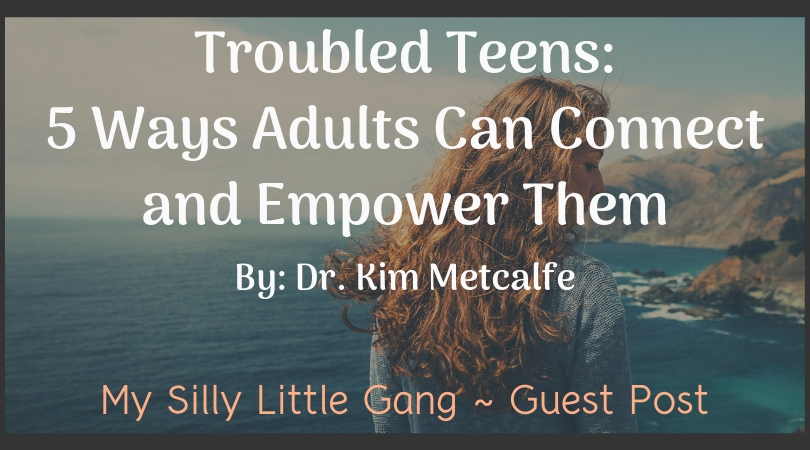Troubled Teens: 5 Ways Adults Can Connect and Empower Them ~ Guest Post

Today’s guest post is: Troubled Teens: 5 Ways Adults Can Connect and Empower Them. I am sharing this article in hopes that you will find it useful. If you do please share it.

Troubled Teens: 5 Ways Adults Can Connect and Empower Them by: Dr. Kim Metcalfe

Growing up I had my grandmother who I could go to for absolutely anything. I thank God that I didn’t have troublesome teens. Yet I feel that if this had been the case my grandmother would have been someone I would have turned to.
Now that I am a parent I am always talking to my boys about everything. I am very blessed that I have such an amazing relationship with them. They know that I will always be available for them without judgement. When I read this article it reinforced my beliefs of the importance of making meaningful connections with our children. I hope that you find this article useful.
Troubled Teens: 5 Ways Adults Can Connect and Empower Them
The statistics suggest that a disturbing percentage of America’s teenagers are in crisis.
In a given 24 hours in the U.S.,1,439 teens will attempt suicide, 2,795 teenage girls will become pregnant, 15,006 teens will use drugs for the first time, and 3,506 teens will run away, according to a report by Verywellmind.com.
Health and education professionals cite numerous socio-economic factors for these youth problems, but some say adults could make a difference if they connected better with teenagers.
“America is unintentionally betraying the emotional and social needs of its adolescents – ages 11 to 21,” says Dr. Kim Metcalfe, an educational developmental psychologist and author of Let’s Build ExtraOrdinary Youth Together (www.xtraordinaryyouth.com). “We have parents, guardians, school teachers, administrators, coaches, and volunteers working with youth every day who have no idea how to use meaningful connections or even how significant they are.
“Adults focus mainly on a young person’s physical and educational needs, but when it comes to supporting adolescents in meeting their creative, social and emotional needs, most of us have limited time to do it. With the right approach and intentions, though, adults can make things better for them.”
Metcalfe notes five ways adults can make meaningful connections with teenagers that can help them navigate the journey to adulthood:
• Be sensitive. “The roadmap to their life journey starts with teen questions like, ‘Who am I?’ and ‘What is my purpose?’ ” Metcalfe says. “Adults need to listen thoroughly and then take the time to guide or advise, and this starts with being sensitive to their intellectual, creative and emotional aspects.”
• Offer encouragement. “Youth who are encouraged by adults will act in connected and cooperative ways,” Metcalfe says. “Encouragement helps youth feel capable and appreciated, but when youth are discouraged, they act in unhealthy ways. The idea is to encourage the development of the whole young person.”
• Elicit their creativity. An adult can empower a young person and give them self-confidence by making them feel important. “One way to do that is by asking them for ideas and possible solutions to problems outside of their own,” Metcalfe says. “You let them take the lead in something. Getting them to think outside the box expedites growth.”
• Let them know you care. “Tell kids that we are on their side, that we love and care about them unconditionally, and that we are there to support them despite their mistakes,” Metcalfe says.
• Emphasize resilience. “Help youth appropriately deal with adversity rather than attempting to remove it or allowing them to run away from it,” Metcalfe says. “That’s where much of the trouble starts – with escape. A strong foundation of support can build self-empowerment that makes them stronger.”
“Meaningful connections are the most powerful way to say to a young person, ‘You matter, you are important, and you are worthy of my time and patience,’ ” Metcalfe says. “These are the messages that support a positive self-image.”
About Kim Metcalfe
Dr. Kim Metcalfe, a retired professor of early childhood education and psychology, is the author of Let’s Build ExtraOrdinary Youth Together (www.xtraordinaryyouth.com). She is a member of the National Association for the Education of Young Children, the California Association for the Education of Young Children, and the American Psychological Association. Dr. Metcalfe has a doctorate degree in Educational Developmental Psychology. To honor her late daughter, Abigail Elise Metcalfe, Dr. Metcalfe founded Abbey’s Purple Winged Angels Foundation – a 501(c)(3) nonprofit organization.